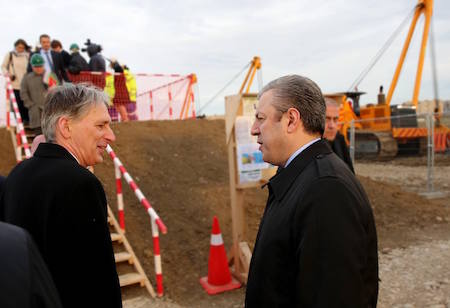South Caucasus Pipeline expansion increases gas capacity
Georgia will receive more natural gas from 2018-19

South Caucus Pipeline (SCP) expansion works are entering the final phase to increase the gas capacity of the pipeline to 16 billion cubic metres (m3) per year.
The Government of Georgia announced Georgia will receive an increased supply of natural gas "at preferential prices” from the end of 2018 or beginning of 2019.
British Petroleum (BP) was carrying out the pipeline expansion works. In the coming years $2 billion USD will be on the project. â¨â¨
Today Georgia’s Prime Minister Giorgi Kvirikashvili visited the construction site with the UK Foreign Minister Philip Hammond.
Kvirikashvili stressed the SCP expansion project was of "critical importance” for Georgia and the wider region.
The SCP was built to export gas from the Shah Deniz gas field in Azerbaijan to Georgia and Turkey. The pipeline begins at the Sangachal terminal near Baku. It follows the route of the Baku-Tbilisi-Ceyhan (BTC) crude oil pipeline through Azerbaijan and Georgia to Turkey, where it is linked to the Turkish gas distribution system.
The pipeline has been operational since late 2006 transporting gas to Azerbaijan and Georgia, and from July 2007 to Turkey from the Shah Deniz Stage 1.
The pipeline has a diameter of 106cm (42 inches) and a total length of 691km, with 443km in Azerbaijan and 248km in Georgia.
Last year operating expenditures were about $47.5 million USD while the SCP cost about $1.1 billion USD in capital expenditure, said BP.
In 2015, SCP’s daily average throughput was 18.6 million m3 of gas per day, BP stated.
The expansion of the SCP is part of the Shah Deniz Full Field Development project. This expansion involves the laying of new pipeline across Azerbaijan and the construction of two new compressor stations in Georgia. This will significantly increase the gas volumes exported through the pipeline.
At the border between Georgia and Turkey, the pipeline will link into other new pipelines to transport gas into Turkey and the European Union (EU).
 Tweet
Tweet  Share
Share